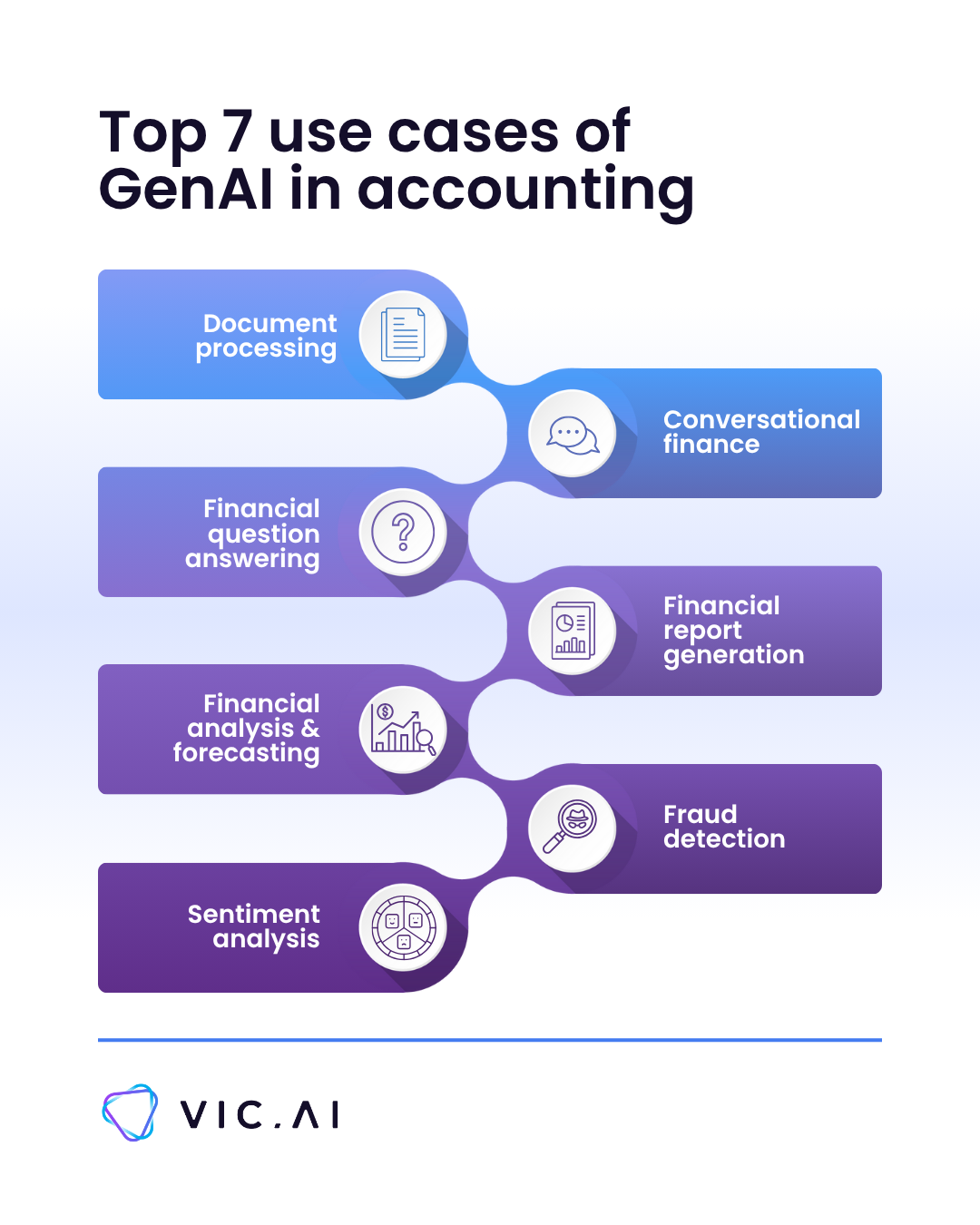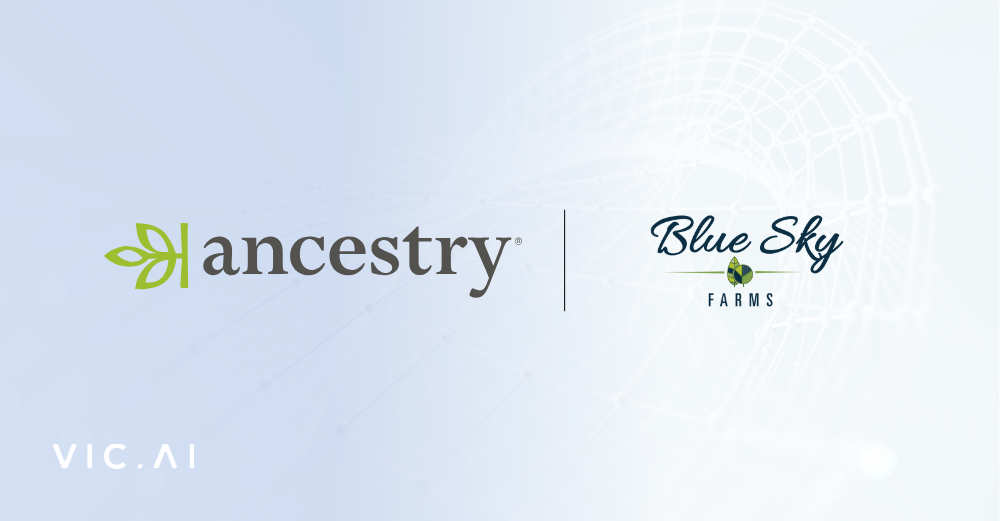Autonomous accounting, powered by advanced technologies such as artificial intelligence (AI) and hyperautomation, is revolutionizing enterprise accounting by automating financial processes, decision-making, and services. Companies are increasingly adopting autonomous finance due to its potential to enhance efficiency, reduce operational costs, and improve customer experiences.
Generative artificial intelligence, or GenAI for short, is revolutionizing accounting by automating financial processes and facilitating decision-making without human intervention. While there are many potential functions that can be reimagined using GenAI, in this article, we cover the top use cases for accounting where this innovative technology can make a big impact.
Key summary
Generative AI is revolutionizing autonomous accounting by automating manual processes, reducing costs, and improving decision-making. Key use cases include document processing, conversational finance, report generation, forecasting, fraud detection, and sentiment analysis. Autonomous invoice processing further drives efficiency, accuracy, and significant cost savings, making GenAI a strategic priority for finance leaders.
What is generative AI?
GenAI refers to a class of artificial intelligence (AI) algorithms that can generate or create new content, such as text, images, music, and even video, without any direct human intervention. In accounting, GenAI can have a significant impact by automating tasks that were previously done manually, such as generating financial reports, performing data analysis, and creating forecasts.
It can also be used to analyze large volumes of financial information and input data, identifying trends and patterns that would be difficult for a human to detect through traditional data collection methods. By transforming how organizations handle data sets, GenAI helps finance teams eliminate repetitive tasks and focus on strategy.
According to KPMG, “Generative AI for finance helps organizations accelerate their path to greater efficiency, accuracy, and adaptability.” This efficiency comes from replacing manually processed workflows with automated systems that deliver extracted data in seconds.
Before diving into specific use cases, it’s important to understand how generative AI in autonomous accounting differs from traditional, manual methods.
Generative AI use cases
Reaching “AP autonomy” across the accounting function requires strategic planning, an implementation and maturity plan, and leveraging the right AI technology. It’s important to select a particular area to pilot GenAI solutions into your operational strategy successfully before embracing enterprise-wide.
Here, we’ve outlined the top seven GenAI use cases for accounting and finance teams:

1) Document processing and analysis
Generative AI can process, summarize, and extract valuable information from large volumes of financial documents, such as annual reports, financial statements, and earnings calls, facilitating more efficient analysis and decision-making.
Instead of relying on humans to manually process this work, AI extracts structured financial information that can be seamlessly reused across the accounting system. This reduces errors and allows businesses to run operations efficiently.
2) Conversational finance
GenAI models can be used to create more natural and contextually relevant responses in AI-powered chatbots or virtual assistants for conversational finance. These assistants can work with input data like invoices or budgets to answer questions or move documents through approval cycles.
As a result, financial services teams can provide better customer support while internal operations remain seamlessly integrated across systems. It can be used externally for customer conversations, as well as internally within departments, such as moving an invoice through the approval cycle.
3) Financial question answering
GenAI can provide accurate and detailed answers to financial questions posed by users, thanks to its understanding of human language patterns and its ability to generate coherent, contextually relevant responses. These models can be trained on large data sets of financial knowledge to respond to a wide range of financial queries with appropriate information.
For accountants, this means less time spent analyzing data manually and more time acting on insights that improve the bottom line.
4) Financial report generation
GenAI can automatically create well-structured, coherent, and informative financial reports based on available extracted data, streamlining the reporting process and reducing manual effort. Reports can be seamlessly integrated with existing financial services dashboards, ensuring leadership sees trends clearly.
Moreover, customized reporting allows finance leaders to show how predictive analytics links directly to performance and cost savings.
5) Financial analysis and forecasting
By learning from historical financial data, GenAI models can capture complex patterns and relationships in the data, enabling them to make predictive analytics about future trends, asset prices, and economic indicators.
When paired with AI and machine learning, these models simulate scenarios and create budgets that keep operations efficient. According to a KPMG survey, 83 percent of respondents reported using AI for financial planning, with results directly tied to the bottom line.
6) Fraud detection
Because GenAI can process massive amounts of data in real real-time, it can flag anomalies for immediate review and prevent fraudulent activities.
GenAI also generates synthetic examples of fraudulent transactions to help AI and machine learning models differentiate between legitimate and fraudulent patterns. This reduces risk across the accounting system and protects sensitive financial information from misuse.
7) Sentiment analysis
GenAI can be used for sentiment analysis to measure brand reputation and customer satisfaction through social media posts, news articles, or other sources.
For finance teams, this adds another dimension to analyzing data by connecting consumer behavior with financial outcomes. By aligning findings with data collection from other channels, companies can adjust strategies and achieve long-term cost savings.
Autonomous invoice processing - a viable use case for GenAI
Beyond the 7 use cases listed above, one of the most manual and time-consuming areas of accounting that can benefit from GenAI is invoice processing. GenAI can be leveraged for complete end-to-end invoice processing, from ingesting invoice data, reading and categorizing invoices, routing documents through workflows, handling approvals based on patterns, and executing payments. By relying on extracted data instead of human entry, invoices can move through approval cycles faster, increased efficiency and accuracy.
Vic.ai, an AI-first platform for accounts payable, is one example of a company leading the autonomous accounting movement. Vic.ai leverages AI technology AI and machine learning for invoice processing and payments to improve speed, accuracy, and scalability, ultimately enabling their customers to shift focus to more strategic, meaningful work. By processing more than half a billion invoices with up to 99% accuracy, Vic.ai has helped 10,000+ customers achieve nearly $200 million in cost savings.
Overall, GenAI has the potential to transform accounting by automating routine tasks, freeing up time for financial professionals to focus on higher-value tasks, and improving the accuracy and reliability of financial reporting and analysis.
Generative AI in autonomous accounting: key takeaways
Overall, GenAI has the potential to transform accounting by automating routine tasks, freeing up time for financial professionals to focus on higher-value work, and improving the accuracy of reporting. By applying predictive analytics to financial information, organizations can identify risks earlier and optimize performance.
The result is a modern financial services function where data collection and input data flow seamlessly, operations run efficiently, and the organization achieves measurable improvements to both efficiency and the bottom line.
With GenAI, enterprises are no longer limited to manually processed data; instead, they gain continuous insight into performance drivers that improve long-term planning and the bottom line.
This article originally published May 2023, and was updated October 2025.
FAQs on generative AI in autonomous accounting
1. How is generative AI different from traditional AI in accounting?
Generative AI not only analyzes financial information but also creates new content, such as financial reports, forecasts, or conversational responses. Traditional AI mainly automates rule-based tasks, while GenAI enables predictive analytics and intelligent decision-making at scale.
2. What benefits does generative AI bring to finance teams?
Generative AI reduces manual processing, lowers operational costs, and improves accuracy by extracting structured data from documents. It also frees up accountants to focus on strategic analysis, driving cost savings, and enhancing the bottom line.
3. Can generative AI completely replace human accountants?
No. Generative AI automates repetitive, high-volume tasks like invoice processing and report generation, but human accountants remain critical for strategic decision-making, compliance oversight, and contextual judgment.
4. What is the most impactful use case of generative AI in autonomous accounting?
While multiple areas benefit, autonomous invoice processing is one of the most transformative use cases. By automating data extraction, approvals, and payments, organizations can significantly increase efficiency, accuracy, and scalability.
This article originally published May 2023, and was updated October 2025.












.svg)
